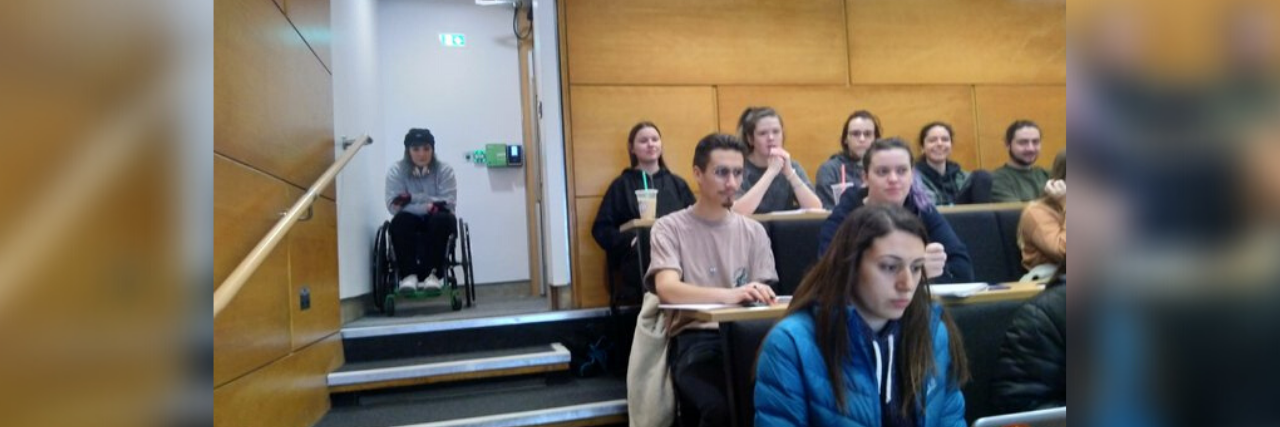What This One Photo Shows About Ableism on College Campuses
I’m Sarah-Marie Da Silva and I am fighting for my rights as a disabled student.
After facing yet another barrier to my education, I decided to show as many people as I could my frustrations with the education system by posting a photo on Twitter. This photo shows something that’s happened to me several times in the past five months — entering a lecture hall only to panic at the sight of stairs blocking the only way to access the room. This is not a singular event in my experience of higher education, nor is it a singular case in the U.K. I can’t get down a flight of stairs, so how am I supposed to access my education?
The reality of this university is disgraceful… pic.twitter.com/2Nsa79YS8m
— Sarah-Marie Da Silva (@SarahMarieDS) February 7, 2020
[Image description: The author — Sarah — sits in a wheelchair on top of a staircase in a lecture hall, where other students are seated.]
The response was more than I ever could have imagined! Hundreds of likes and retweets later, I was doing interviews to make sure my message was heard loud and clear: I will not put up with this any longer. The feedback I received just proved this is an international issue and pushed me to keep going. I want to see change for everyone with mobility impairments.
Stairs are not the only problem I face when it comes to equal access. When there are stairlifts, they’re often broken — I have been stuck on one for 15 minutes, unable to leave my lecture. Standard elevators are broken in the science buildings, so I have to use a freight lift to get upstairs. This involves opening two doors manually, and I have to fully extend my arm because the handle is too high, causing an unreasonable amount of pain. That particular lift doesn’t have an alarm, so if it breaks down, no one can help me. And if, God forbid, someone else uses the lift and leaves the doors open on another floor, I cannot call it, and that lift cannot be used.
Even in the disabled toilets, the emergency pull cords are sometimes three feet off the ground, which is not going to help anyone if they fall and cannot get up.
I pay the same amount of money as my fellow classmates; they receive access to the lecture halls, to a desk and to the feeling of safety that no matter where they go inside the university, they will be accommodated (something many people take for granted). I pay over £9,000 a year to receive an equal and inclusive education, yet I am in classrooms that are outdated and exclusionary. I have tried to work with the university, I have talked to everyone who I was told could help me with nothing to show for it. Every week, I have sent emails, made meetings and cried in offices trying to explain how isolating it is to be excluded from everyone — to be treated like I’m not like everyone else, like I am not human.
I live an incredibly full life. I go to the gym, I go to the shops by myself, I play wheelchair basketball, I spend time with my boyfriend, my friends and my family, but then I go to university. I am then stripped of that normalcy and reminded that I am “different” — that I can’t walk downstairs, that I am in a wheelchair, that “my place” seems to be away from everyone else.
I’ve had previous mental health problems, but getting anxiety going into a lecture hall is something I never thought I would have to deal with. I was assured by the university, months before I even started, that accessibility would not be an issue and that my university experience would be just like everyone else’s. It’s fair to say that this has not been the case.
“When people cite ‘historic preservation’ as a reason for not providing accessibility, the history that is being preserved is one of discrimination, ableism, exclusion, isolation, hate, fear, and institutionalisation.” — Dr. Jason Dorwart.
A small ramp or stairlift added to lecture halls is not much to ask for and does not affect the “building’s structural integrity,” so the university does not have an excuse for its separation of me from my classmates. Is it acceptable to have women and men separated in higher education? So why does the university think it is acceptable for able-bodied and disabled students to be apart?
I want other disabled students out there to know that, yes this is the norm for most of us, but that does not make it right. We should not applaud mediocrity, casual discrimination or “be grateful” for what little is already put in place for us. You are worth so much more than that; you deserve equity, freedom and equal access to education. If you are feeling isolated, anxious or alone, know you are not fighting this by yourself. This world was not built for us, but one day it will be and that’s what I’m fighting for. I hope you’ll fight for it with me.
Following Sarah’s tweet, the union of the university she attends released a statement, which you can read here.

